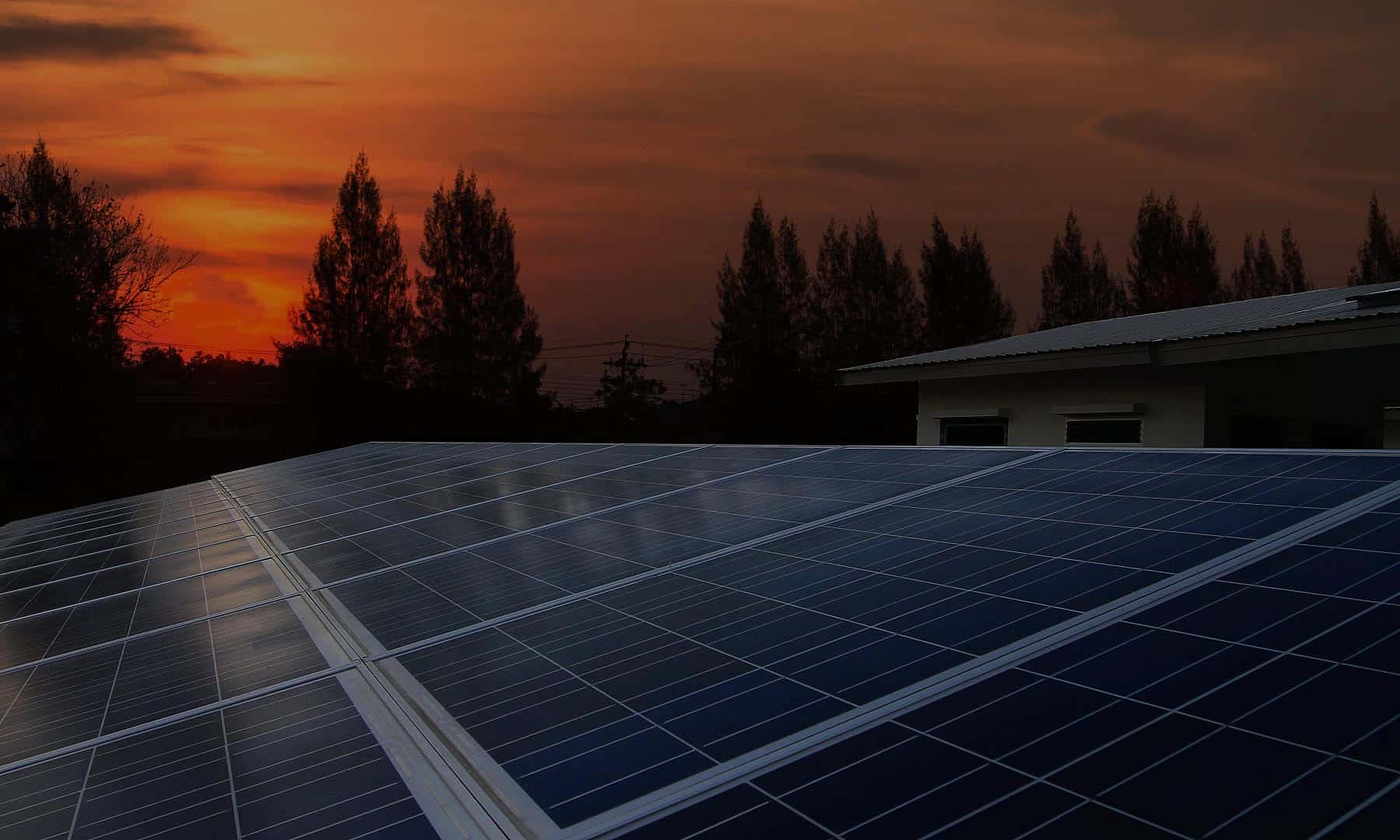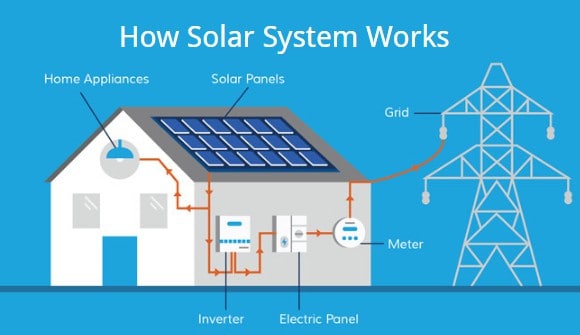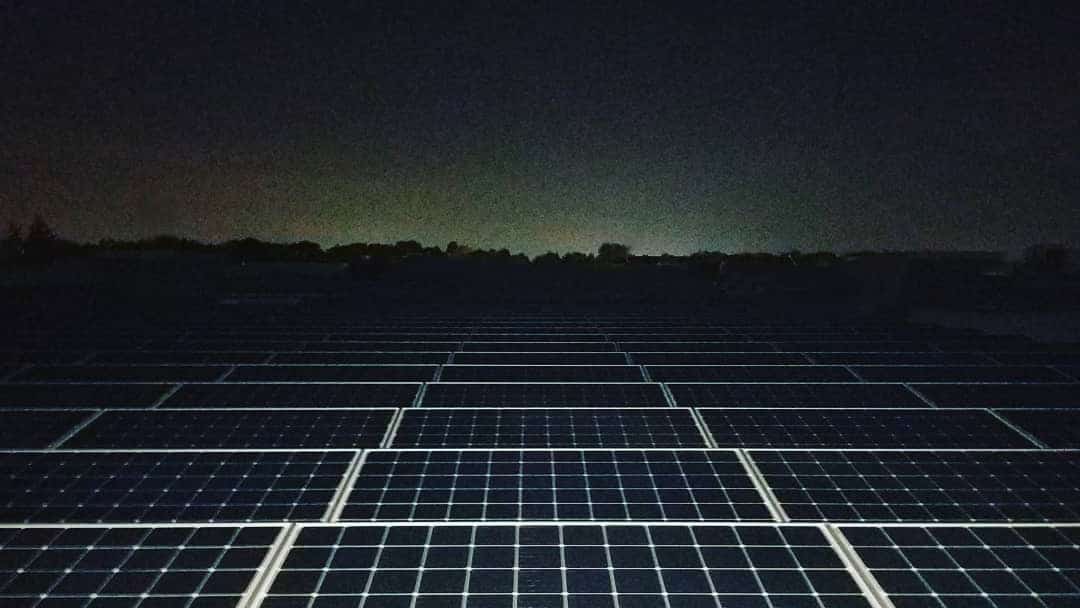Have you ever wondered just how solar panels work? I’ve wondered about that for a long time. I knew that solar panels collected energy from the sun, but I wasn’t sure exactly how. It’s one of those things that you assume you know, but when you dig into it, there’s more to it than you’d think.
Now, I’ve done a lot of research, and I want to share it with you. I’ll tell you all about solar energy and I’ll answer the question, “Do solar panels work at night?”
How Do Solar Panels Work?
Our sun is basically an enormous nuclear reactor that throws out vast amounts of energy in all directions, all of the time. This energy comes to earth as heat, light, and other forms of energy like radiation.
All of this energy is blasted out from the sun as photons. These are tiny particles/waves of energy that are if you like, the sun’s rays.
Solar panels are systems that allow us to capture this solar energy and convert it into electrical power. Solar panels are made up of thousands of tiny solar cells. These solar cells are the critical components where photons are harnessed to produce electrical energy. The scientific name for a solar cell is a photovoltaic cell.
Solar cells contain two tiny discs of silicon sandwiched together. These two pieces of silicon have different electrical charges, one positive and one negative. Placing these differently charged discs close together produces an electrical field.
When a photon hits a solar cell, it creates a reaction with this electrical field that displaces electrons.
Electrons are charge-bearing subatomic particles. When this reaction between the photon and the silicon discs frees electrons, they start to move around rapidly. This motion creates direct current electricity. This is a very brief description of the process; you can find more information on how this reaction works here.
In this direct current form, the electricity created by a solar cell isn’t of much use because we power our homes using a type of electricity called alternating current.
However, the generation of direct current instead of alternating current isn’t a problem, as solar systems can use an inverter to convert direct current electricity into alternating current power.
This understanding of how solar panels work helps us to go on to answer the question of whether solar panels work at night.
Do Solar Panels Work At Night?
The sun is the one and only source of the photons that a solar cell uses to generate electricity. So, a solar panel can only absorb energy during daylight hours.
This knowledge gives us a simple answer, at least in part, to our original question. Solar panels cannot capture energy at night (although this might change in the future, see below.) And since they can’t absorb any energy, solar panels do not create electricity at night.
When do Solar Panels Work?
Let’s address another common misconception while we are here. Some people think that solar panels only absorb energy when they are exposed to direct sunlight.
This simply isn’t true. Even on cloudy days, the sun’s energy is so powerful that it breaks through the cloud cover. So solar panels absorb a smaller but not insignificant amount of energy from the sun even when it is cloudy or even raining.
Do Solar Energy Systems Work at Night?
It’s important to remember that a solar panel is just one component of a solar energy system. Solar systems comprise solar panels full of tiny solar cells, but they also include the means to transfer, convert, and use or store this energy.
So, although energy from the sun isn’t adding electricity to a home solar system at night, this doesn’t mean that the system isn’t working. As long as your solar system has some means of on or off-grid storage available, then it allows you to make use of the collected energy to power your home.
Even though the sun isn’t shining, your solar system is by no means inactive at night.
How Do Solar Systems Store Energy?
There are two main ways that solar systems store the electricity that they create. Which method you use depends on whether your solar power system is a stand-alone unit or whether you connect it to the local power grid. Let’s take a look at both types of storage.
Off-Grid Systems
an off-grid solar system is a stand-alone installation that collects energy and converts it to electricity. If you want your off-grid solar system to provide you with power at night, then you need to find somewhere to store that energy. The place that off-grid systems use to store electricity is in one or a series of batteries.
Batteries are a vital component of an off-grid solar system if you want to be able to use the electricity that you collect after the sun goes down. Without a battery, your solar panels will only be able to power your home while they generate electricity from the sun.

The batteries you use in an off-grid solar system are much larger than those you’d use in a mobile phone but the principle is very much the same. Batteries allow you to store energy when your mobile phone is charging or when the solar panels are generating electricity during daylight. At these times, batteries absorb this electrical energy and convert it to chemical energy, kept inside the battery.
Then when the power stops being added to the battery, the system is reversed, and the stored chemical energy within a battery gets converted back to electrical energy which flows through your home electrical system, providing you with power.
We won’t go into the detailed chemical reactions here. Still, it’s interesting to note that the process again involves controlling a flow of electrons, the subatomic particles we use to provide electrical current.
On-Grid Systems
these days on-grid systems are the most common kind of solar system. In an on-grid system, you connect your home to the power network of your local utility. Whether or not your solar system is operating, it has access to a regular electricity supply night and day.

When connected, an on-grid solar system makes the electricity generated by the user’s solar panel available both to the user and the network.
An on-grid setup is handy since it means that if your solar system doesn’t generate all the power you need, then you can just tap into the local grid to make up the shortfall. The other cool thing is that in the event that your solar system produces more electricity than you need, then you can sell it back to the network.
So when your on-grid solar system generates more electricity than you use, you can watch your electricity meter moving in a reverse direction, and you make a profit from the system.
Hybrid Systems
if you use a hybrid solar system, then you get the best of both worlds.
A hybrid solar panel system has all the connectivity of the on-grid solar system. You experience the benefits of sharing your electricity.

But a hybrid solar system also gives you the ability to store the energy that you produce in batteries. So a hybrid system is an excellent way to get yourself a backup power supply. Then when you have a power outage, you can just switch to battery power can continue using your electricity as usual.
Will Solar Panels Ever Be Able To Work At Night?
While it sounds wildly unlikely after all we’ve learned, a recent scientific paper suggests that a ‘solar panel that works at night is well within the realms of possibility.
This paper suggests a novel system that uses the difference between the night-time heat of the earth and the night sky’s coldness to generate energy. This system works in a reverse way to conventional solar panels. It’s still a long way off, but it seems that a method of collecting power from the stars is within the grasp of modern science.
Summary
We have seen that solar cells produce energy by reacting with the photons they collect from the sun and turning this energy into electricity.
Given that this process can only happen when the sun is in the sky, we concluded that solar panels, taken alone, do not work at night.
But then, by looking at solar systems as a whole, we have discovered how they collect and store electricity and allow us to use it twenty-four hours a day.
And then we’ve taken a glimpse at how, in the fast-changing world of science, there might just be a way in the future that we can get energy from “solar” panels at night. I wonder if we will call them lunar panels.
If you have any questions or thoughts on this article, then please share them in a comment.





